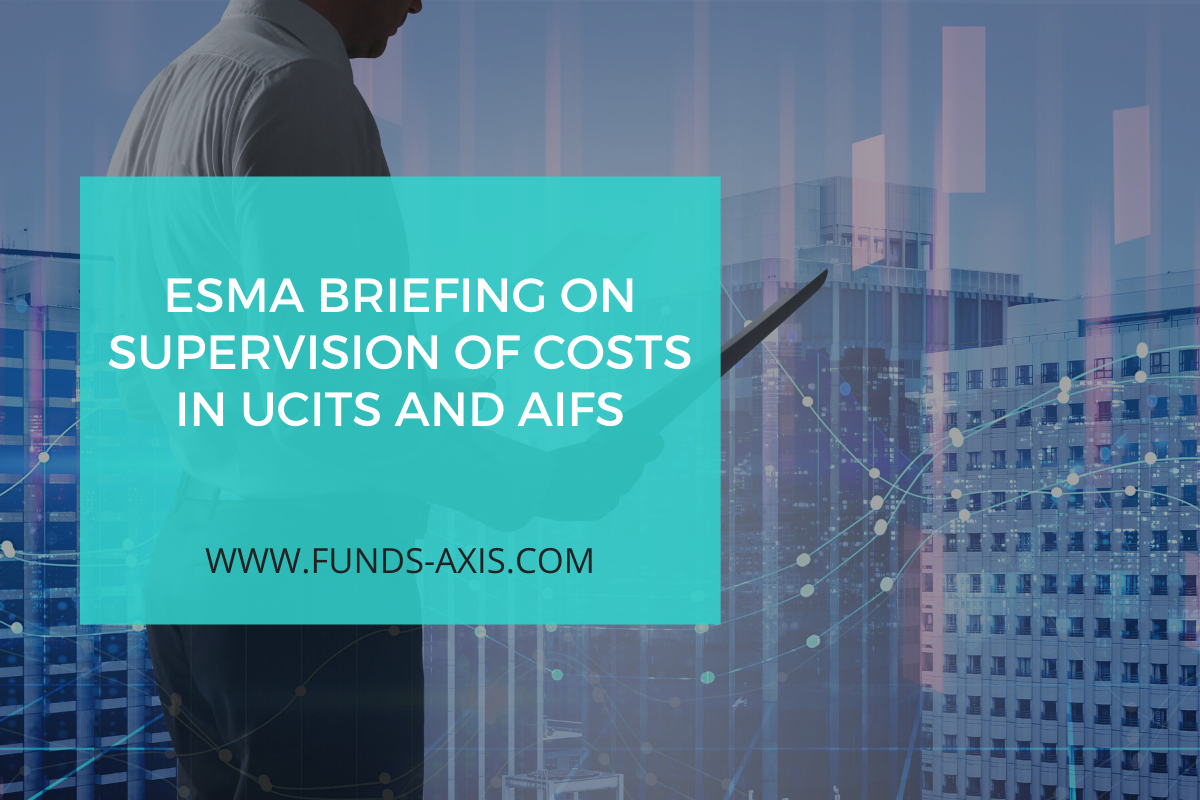The European Securities and Markets Authority (ESMA) has published a supervisory briefing on the supervision by National Competent Authorities (NCAs) of costs applicable to Undertakings for the Collective Investment in Transferable Securities (UCITS) and Alternative Investment Funds (AIFs).
Background
Both the UCITS Level 2 Directive and AIFMD Level 2 Regulation provide that investment funds must prevent “undue costs” being charged. In July 2019 ESMA launched a survey among NCAs on national approaches to the supervision of the cost-related provisions under the UCITS and AIFMD frameworks.
The results of the survey indicated that there is a lack of convergence on the way the notion of “undue costs” is interpreted across the EU and on the supervisory approach to the cost-related provisions.
To promote convergence in relation to the supervision of costs in UCITS and AIFs, ESMA has developed criteria to support NCAs in:
- assessing the notion of “undue costs”;
- supervising the obligation to prevent undue costs being charged to investors
Pricing Process
ESMA expects regulatory authorities to require management companies develop and periodically review a structured pricing process addressing the following elements:
- whether the costs are linked to a service provided in the investor’s best interest. It should therefore be assessed whether the costs are necessary for the fund to operate in line with its investment objective (e.g.: the fund’s investment strategy, portfolio management, transaction and settlement costs), or strictly functional to the ordinary activity of the fund or to fulfil regulatory requirements (e.g. cost of annual audit, taxes, NCA’s fees);
- whether the costs are proportionate compared to market standards and to the type of service provided (e.g.: by mean of a table displaying costs of funds with similar investment strategies and characteristics in order to detect outliers) particularly in the context of potential conflict of interests in the context of payments to third parties (e.g.: legal or other type of professional consultancies), intragroup delegation (e.g. portfolio management, service provisions) or depositary functions;
- whether the fee structure is consistent with the characteristics of the fund (e.g.: higher costs would normally be charged to funds with more complex investment strategies/type of assets; there should be a balance between the complexity of the activities performed and the costs borne by investors);
- whether the costs borne by the fund, including those paid to third parties (e.g.: depositary), are sustainable taking also into account the expected net return of the fund, based also on its risk profile and investment strategy;
- whether the costs ensure investors’ equal treatment and are not of material prejudice to the interests of any class of unitholders or potential unitholders, except for AIFs not distributed to retail investors disclosing a preferential treatment in their rules or instruments of incorporation where such a preferential treatment is allowed under the applicable legislation;
- whether there is no duplication of costs (e.g.: the same type of fee is not included in two different cost categories) and costs are properly separated and accounted for. To this purpose, a clear distinction between the costs charged to the fund and those paid directly to the management company and/or the depositary and/or any other third party should be made;
- whether a cap on fees (e.g.: subscription/redemption fees), if any, is applied and clearly disclosed to investors (e.g.: expressed as a percentage of the NAV);
- in case of UCITS and relevant AIFs, if the fund charges performance fees, whether the performance fee model and its disclosure is compliant with the ESMA Guidelines on performance fees
- whether all costs are clearly disclosed to investors in line with applicable EU rules (AIFMD, PRIIPs and UCITS5 ), as well as any additional rule applied at national level;
- whether the pricing process and all charged costs are based on reliable and documented data, in order to ensure the ability of the NCA to reproduce ex post the calculations made by the management company on a single portfolio level
Supervision Obligations
To ensure that undue costs are not charged to investors, national regulators should “review of management companies’ pricing processes in their supervisory activity at different stages.”
In the briefing, ESMA state that the national regulators supervision should cover:
- Cost disclosure and transparency:
o the existence, nature and amount of the costs/fees are clearly disclosed to investors in a manner that is comprehensive, accurate and understandable;
o the charged costs are consistent with funds’ rules and documentation - Business conduct, strategic risk and reputational risk.
- Pricing processes to ensure that:
o they clearly sets out responsibilities among the management bodies of the firm in determining and reviewing the costs charged to investors;
o in case of the existence of conflicts of interest, it ensures that the risk of damage to investors’ interest will be prevented;
o it is clearly documented and periodically reviewed.
Corrective Action
Finally, in situations where undue costs are charged to investors, ESMA provides that the supervisory action should include:
- Investor compensation, where allowed under the national provisions;
- Reduction of fees;
- Review of disclosure documents;
- Communication of good and poor practices
